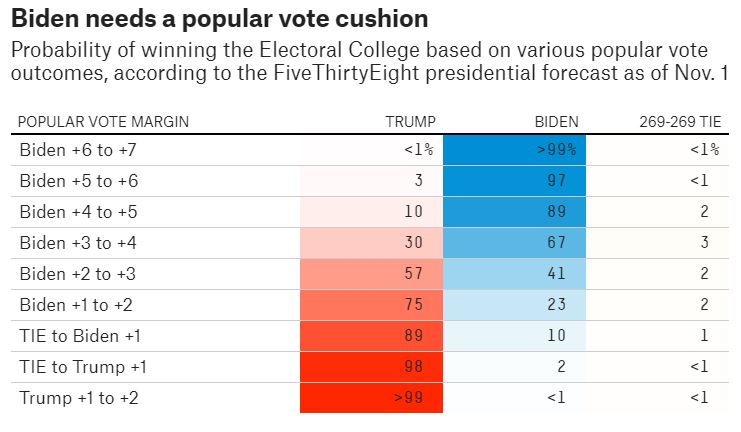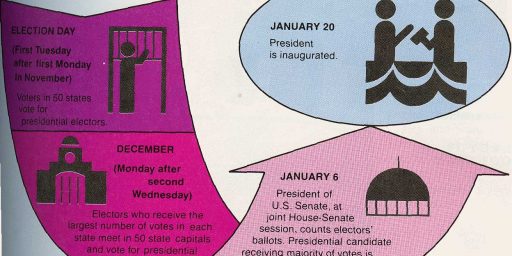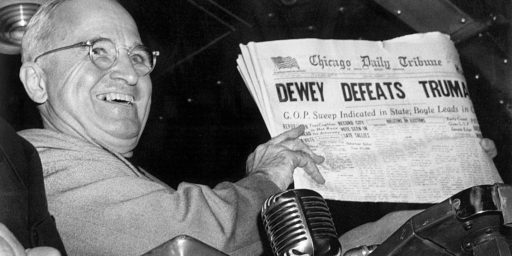Supreme Executive Power Derives from a Mandate from the Masses
Strange women lying in ponds distributing swords is no basis for a system of government!
FiveThirtyEight’s Nate Silver is “Here To Remind You That Trump Can Still Win” because, while Joe Biden has had a fairly commanding lead in the polls for more than a year, there are all manner of marginal uncertainties.
Really, though, it boils down to this graphic:

That’s right: because so many states are lead-pipe cinches for one party or another, Trump would actually be more likely to win than not if the polls showed Biden with a 2-3 point lead! Conversely, a 6-7 point lead gives him about the same odds of winning as a 1-2 point lead would give Trump. That’s just madness.
Broken down more specifically,
If Biden wins the popular vote by 2 to 3 percentage points, the Electoral College is roughly a toss-up. But if Biden wins the popular vote by less than 2 points, Trump is a fairly heavy favorite to win the election. Even popular vote margins of up to 6 points are not entirely safe for Biden if his votes are distributed in exactly the wrong way. So you can see why an 8- or 9-point lead in the popular vote shouldn’t make Biden feel that secure; despite being a landslide margin, it’s also only a few points removed from the inflection point where the Electoral College starts to become competitive.
Biden’s position would simply be a whole lot safer if one of two things were true: If either the polling in Pennsylvania were like that in Wisconsin and Michigan, where he has a larger lead … or if another state such as Florida were also polling more like Pennsylvania to give Biden a clear Plan B. But neither of those things are true. The gap between Pennsylvania and Wisconsin and Michigan has actually grown in the waning days of the election. And no state has emerged out of the pack of Arizona, North Carolina, Florida and Georgia to be Biden’s clear Plan B (Biden is forecasted to win each state by between 1 and 3 points). Arizona is probably Biden’s best bet in this group, but winning it would also require him to win either Nebraska’s 2nd Congressional District or Maine’s 2nd Congressional District to break a 269-269 Electoral College tie; he’s favored in both districts but they aren’t sure things.
As noted yesterday, I think the polls are over-correcting for 2016 in their likely voter screens and that Biden will sweep the close states. But the notion that the whims of undecided or reluctant voters in three midwestern states should decide who governs for the next four years—even if millions more Americans vote for the other guy—is plain nuts.






Ahh, that lovely electoral college…is it any wonder that Republicans don’t want to get rid of it…
Have I mentioned that the Electoral College is a retrograde institution that no other country uses nor would they use it if they got the chance? And that it doesn’t even function like it was designed and that the way we have added states and population have further distorted it?
Just checking.
😉
@Steven L. Taylor & James:
But if we got rid of the Electorial College then all of the patriot farmers would really flex their power and stop feeding those “taker cities.”
(Of course, this also ignores the many, many, many Republican farmers in states like NY who are getting disenfranchised by the Electoral College.)
strange women lying in ponds….
I can’t think of a more apt quote, congrats!
Yet, a not insignificant portion of the electorate believes that their candidate was sent by their god.
That’s not far from strange women handing out swords.
@Steven L. Taylor: Indeed. But it’s actually worse in practice than in how we tend to think about it. It’s not JUST a matter of voters in some states counting more than those in others but that THE MARGINAL VOTER in a handful of states has outsized power. It would be one thing to give a nod to Federalism (which, as you note, doesn’t at all work like it did in 1787) but piling winner-take-all on top of that is just nuts, absurdly magnifying close calls.
So, we still talk about 2016 as though there was a Trump landslide in the Upper Midwest when, in reality, it was a coin toss there that Trump won.
In 1970 we came close to eliminating the Electoral College. Erik Loomis at LGM provides a bit of history I was unaware of. In 1969 the House, by 338 to 70, sent an Amendment to the Senate to replace the Electoral College and select the president by popular vote. It was highly popular, but Strom Thurmond, then leader of the Dixiecrats, successfully filibustered it in the Senate. In the southern states, black votes for president were wasted votes and Thurmond wanted to keep it that way. He cynically, and successfully, recruited big city black and Jewish leaders to pressure their Senators to support his filibuster.
The Senate came up five votes short of breaking the filibuster. So close and yet so far.
And before Keef or JKB shows up to educate me that Thurmond was a D and Blacks voted R, I know that. I even knew Abraham Lincoln was a Republican. That was then, this is now.
@James Joyner:
And in FL in 2000.
@gVOR08:
Actually, neither was true by this point. Thurmond became a Republican September 16, 1964 and Blacks mostly moved to the Democratic coalition under FDR. The oddity of our two-party system—which was a one-party system in the Deep South until the 1980s—was that Bull Connor and Martin Luther King Jr were fighting one another within the same political party.
@gVOR08: Absolutely. I think, because Florida was the focus of the country while we watched the machinations there, people were at least aware that it was a close vote. But we still put up the Red/Blue maps and talk about states as though they’re monoliths, even though they’re often “Red” or “Blue” by relatively thin margins. Even rock-rib Republican states like Alabama are a third or more Democratic. (Trump won 62-34, Romney 60-38, and McCain 60-39)
@James Joyner: Thank you.
There’s only one woman around with the sword of power; and she’s not distributing it. 🙂
@James Joyner:
Which would totally stop JKB or keef from trying to use that argument. Totally.